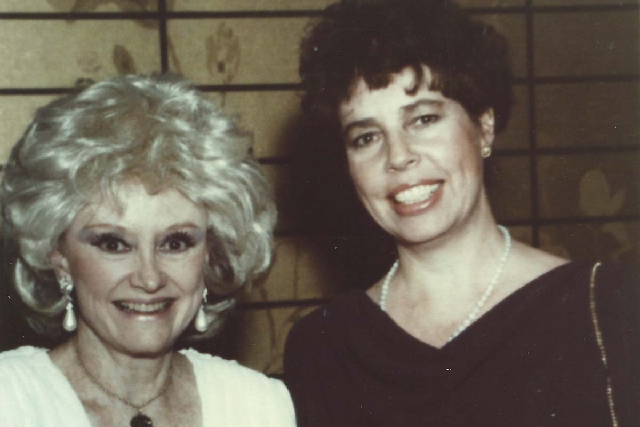Working for comic had a few laughs

It’s not like it’s a dirty little secret, but Robin Skone-Palmer seldom brings up that she was a personal secretary for comedian Phyllis Diller and knows the ups and downs of working for a celebrity.
The Las Vegas woman doesn’t usually dwell on that job, but that changed since she authored “Beyond the Spotlight” about her nearly two years working for the comedian during her peak performing years in the early ’70s.
Diller transitioned from funny housewife to hilarious comic with her nightclub debut in 1955. Her career of 47 years as a stand-up comic relied on hilarious, self-deprecating one-liners plus wild clothes, fright wigs and the raucous laughter that was so distinctive one could hear it in a restroom stall and know it was Diller.
“I could walk on my hands across Golden Gate Bridge and I’d still be defined by once being the personal secretary to Phyllis Diller,” Skone-Palmer said over lunch Wednesday at the Springs Preserve.
While she gives insights into the hugely popular entertainer, Skone-Palmer also strips bare what it’s like to be a personal secretary and assistant, whose job ranged from making sure Diller was never alone to counting the 40 or so bags coming off a plane and making sure none was lost.
Since Diller traveled extensively to perform, counting the bags and guaranteeing their safety was one of Skone-Palmer’s more monotonous, yet nerve-wracking jobs. To lose one of Diller’s wigs or dresses meant doom.
Scone-Palmer, now 71 and retired, has had a string of fascinating secretarial jobs, starting at the Hollywood Bowl, with its freebie concerts. Then it was on to five years with the Foreign Service, first in Pretoria, South Africa, then in London. She worked for Diller from September 1970 until she quit in July 1972. After that, she worked five years in Los Angeles for Roy Gerber, Diller’s manager, who also handled celebrities including Candice Bergen and Alan Alda.
Skone-Palmer worked for a judge in Houston, then moved to Las Vegas in 1980 to marry a Las Vegas stage manager at the Riviera. First she worked for a state judge, but in 1982 she was hired to work in the U.S. Attorney’s office, where she stayed until retiring in 2004.
The lesson she learned from working for Diller? “Fame is not something to be coveted. You can’t go out to a restaurant or have dinner with a friend. And there are the loonies. I guess I learned to enjoy life as it comes.”
Her book describes the shock on those occasions when Diller received death threats. Once in Las Vegas, just before a show, a caller said Diller’s daughter, Stephanie, had been kidnapped. It was a hoax, but Diller didn’t find that out until after she went onstage and performed.
From the perspective of a 28-year-old woman, Skone-Palmer said she found Diller “demanding but not unreasonable.” Yet Diller estimated that during her years, she went through 40 “dustbiters” as she called them, secretaries who she said “stood it for as long as they could, then they bit the dust.”
The meanest Diller ever was to her, and Skone-Palmer didn’t put this in the book, was about a week and a half on the job when a flight from Los Angeles to Pittsburgh had to be changed. At the L.A. airport, the agent said they wouldn’t make the second connection. “She ripped me a new one with people walking by … it was the worst experience I had with her.”
Diller’s husband at the time, Warde Donovan, was more demanding and controlling than his wife and often demanded schedule changes just to show he had the power. Diller divorced him in 1975, and he comes off as the villain of the piece with story after story of his obnoxious behavior.
The most enjoyable part of working for Diller was the travel. “There is no other job like traveling with a celebrity,” she said.
In her book, Skone-Palmer described Diller as “demanding and not always in a good mood, but she had plenty of good qualities. She didn’t use foul language, she didn’t throw temper tantrums, she could be generous when it suited her , and mostly gave credit where it was due. She was invariably pleasant to the people we worked with.”
Skone-Palmer learned to accommodate Diller’s quirks. She’d break chips in a bowl, because Diller only ate the broken ones.
Only once did someone from the media approach her and ask her to spill the beans about Diller. He offered her $50. She said no.
Many will be surprised about this book. The members of her Shadow Hills Church, the elementary school students who attend her Bible study class. Her pals at pottery. Even some golf buddies.“That job sort of defined me, but it’s only part of who I am,” Skone-Miller said. “My life has been an E-ticket ride all the way.”
At 95, Phyllis Diller died in her sleep on Aug. 20, 2012.
Joan Rivers told the Los Angeles Times that Diller “was the last of the women comedians who had to make themselves ugly to be laughed at.”
Skone-Palmer remained a lifelong friend and her last time seeing Diller was in 2011 when she and three other Diller dustbiters were invited on the Rosie O’Donnell show for a tribute to Diller. That night at a small dinner, she observed Diller at 94 was “vibrant and happy, surrounded by people who adored her.”
And that was no joke.
Jane Ann Morrison’s column appears Monday, Thursday and Saturday. Email her at Jane@reviewjournal.com or call her at 702-383-0275.












